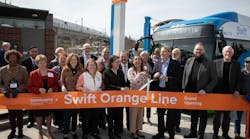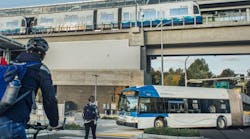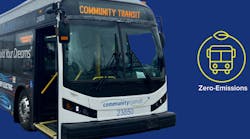Community Transit receives first hydrogen fuel cell bus
Community Transit will launch a hydrogen powered pilot test of a fuel cell electric bus (FCEB) in its Snohomish County, Wash., service later this year as part of its commitment to environmental sustainability.
In addition to the FCEB manufactured by New Flyer of America, Community Transit also recently took delivery of its first battery-electric bus (BEB) made by GILLIG.
“Riding the bus is already one of the most effective things you can do to reduce your carbon footprint and moving away from diesel-powered buses reduces that impact even more,” said Community Transit CEO Ric Ilgenfritz. “Our journey towards a zero-emissions fleet continues as we prepare to learn real-life lessons by putting a fuel cell electric bus in service, along with a battery-electric bus.”
The agency will test and evaluate the performance of both types of electric buses in service. Close monitoring will validate the performance assumptions in the agency’s transition plan, which envisions use of FCEB technology on heavy duty routes like Swift bus rapid transit (BRT) lines where greater battery range would be necessary.
“This is the beginning of a two-decade plan to achieve a full conversion to a zero-emissions fleet by 2044,” Ilgenfritz said. “In addition to seeing how the buses perform in operation, we’ll continue to explore charging and fueling options as well as train and build our workforce.”
The new zero-emissions buses are currently undergoing preparations for their service debut. The buses are being outfitted with onboard technology and other standard equipment, such as a fare box so the buses can run just like the existing Community Transit fleet. Community Transit says customers will notice a quieter ride and a new bold, signature design on the outside of the buses.
Regular service on the BEB is expected to start in summer 2024 while service on the FCEB will start in the fall.
Community Transit expects to transition 30 percent of its 260-bus fleet by 2030. The agency’s Long Range Plan, Journey 2050, establishes a target of achieving a full transition to zero-emissions buses by 2044.






